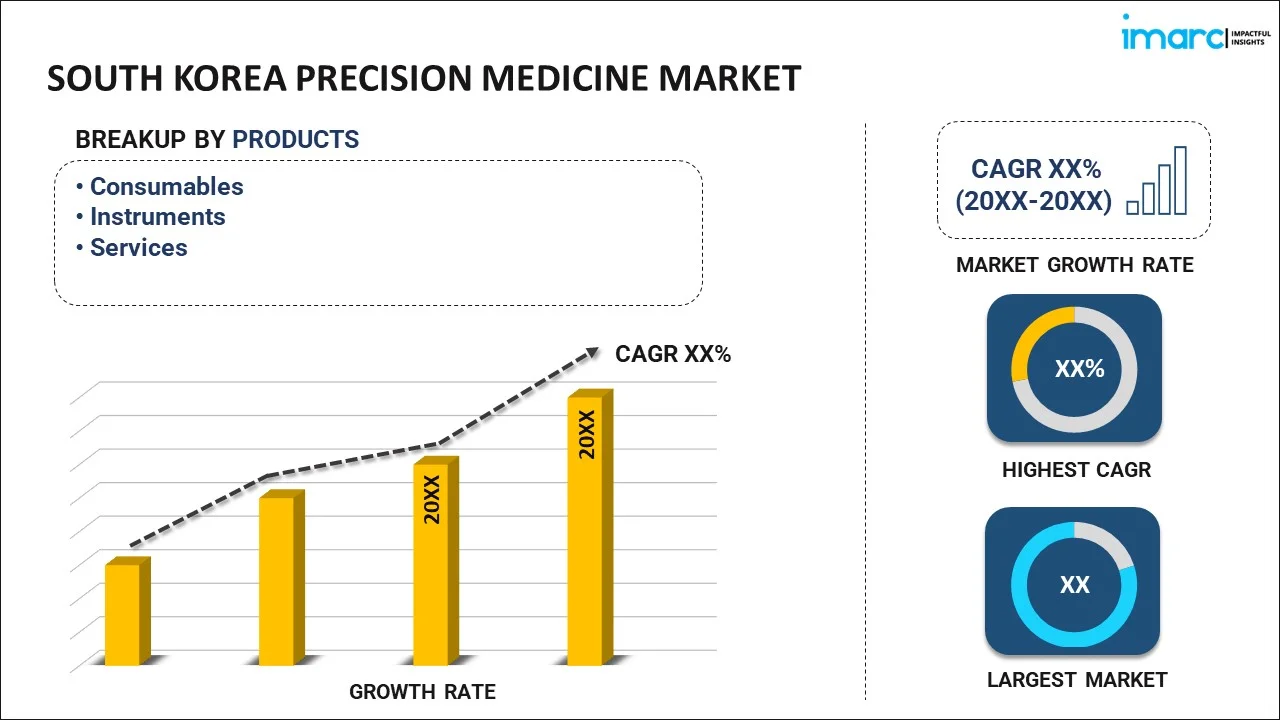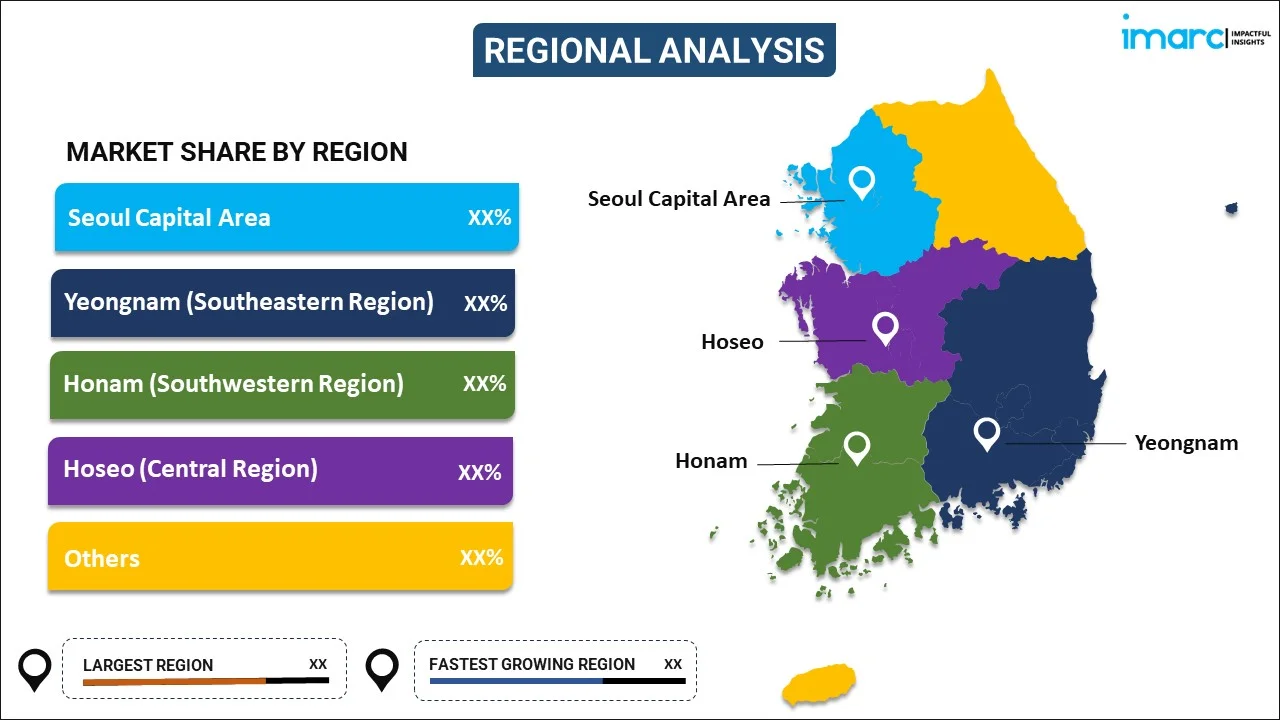
South Korea Precision Medicine Market Report by Product (Consumables, Instruments, Services), Technology (Big Data Analytics, Bioinformatics, Gene Sequencing, Drug Discovery, Companion Diagnostics, and Others), Application (Oncology, Central Nervous System (CNS), Immunology, Respiratory Medicine, Infections, and Others), End User (Hospitals and Clinics, Diagnostic Centers, Pharma and Biotech Companies, Healthcare IT Firms, and Others), and Region 2026-2034
Market Overview:
South Korea precision medicine market size reached USD 1,564.7 Million in 2025. Looking forward, IMARC Group expects the market to reach USD 2,386.0 Million by 2034, exhibiting a growth rate (CAGR) of 4.8% during 2026-2034. The rising demand for personalized healthcare solutions tailored to individual genetic profiles, rapid advancements in genomics, presence of robust healthcare infrastructure, collaborations between research institutions, expansion of pharmaceutical companies, and burgeoning healthcare expenditure are some of the factors stimulating the market growth.
|
Report Attribute
|
Key Statistics
|
|---|---|
|
Base Year
|
2025 |
|
Forecast Years
|
2026-2034
|
|
Historical Years
|
2020-2025
|
| Market Size in 2025 | USD 1,564.7 Million |
| Market Forecast in 2034 | USD 2,386.0 Million |
| Market Growth Rate (2026-2034) | 4.8% |
Precision medicine, also known as personalized medicine, is a cutting-edge approach to medical treatment that tailors healthcare decisions, practices, interventions, and products to individual patients. It is rooted in the recognition that each person's genetic makeup, lifestyle, and environment can significantly impact their health and response to medical treatments. One of the fundamental aspects of precision medicine is the utilization of genetic information through techniques, such as genomic sequencing. By analyzing a person's deoxyribonucleic acid (DNA), scientists and healthcare professionals can identify specific genetic variations that may contribute to diseases or affect how a patient responds to medications. This information can be used to create tailored treatment plans, and selecting the right medications and therapies that are most likely to be effective for an individual. It is particularly significant in oncology, where it has revolutionized cancer treatment. By understanding the genetic mutations driving a patient's cancer, oncologists can prescribe targeted therapies that specifically attack those mutations, leading to improved treatment outcomes and fewer side effects compared to traditional chemotherapy. Additionally, precision medicine is being used in areas like cardiovascular diseases, neurology, and rare genetic disorders.
South Korea Precision Medicine Market Trends:
The South Korea precision medicine market is influenced by several key drivers, such as the rising demand for personalized healthcare solutions, stemming from the increasing awareness of the benefits of tailoring medical treatments to individual genetic profiles. This is further amplified by advancements in genomic research and technology, enabling more accurate diagnoses and targeted therapies. Moreover, South Korea's robust healthcare infrastructure plays a pivotal role in fostering the precision medicine market. The country boasts a well-developed healthcare system and a high level of healthcare access, which facilitates the integration of precision medicine into clinical practice. In line with this, government initiatives supporting precision medicine have also been instrumental in propelling the market growth. Furthermore, collaborations and partnerships between research institutions, pharmaceutical companies, and healthcare providers are accelerating the market growth. These collaborations accelerate research and development (R&D) efforts, promote knowledge sharing, and facilitate the translation of research findings into clinical applications. Moreover, substantial investments in the South Korean precision medicine sector and rapid infrastructure development are positioning South Korea as a competitive player in the global precision medicine landscape.
South Korea Precision Medicine Market Segmentation:
IMARC Group provides an analysis of the key trends in each segment of the market, along with forecasts at the country level for 2026-2034. Our report has categorized the market based on product, technology, application, and end user.
Product Insights:

- Consumables
- Instruments
- Services
The report has provided a detailed breakup and analysis of the market based on the product. This includes consumables, instruments, and services.
Technology Insights:
- Big Data Analytics
- Bioinformatics
- Gene Sequencing
- Drug Discovery
- Companion Diagnostics
- Others
A detailed breakup and analysis of the market based on the technology have also been provided in the report. This includes big data analytics, bioinformatics, gene sequencing, drug discovery, companion diagnostics, and others.
Application Insights:
- Oncology
- Central Nervous System (CNS)
- Immunology
- Respiratory Medicine
- Infections
- Others
The report has provided a detailed breakup and analysis of the market based on the application. This includes oncology, central nervous system (CNS), immunology, respiratory medicine, infections, and others.
End User Insights:
- Hospitals and Clinics
- Diagnostic Centers
- Pharma and Biotech Companies
- Healthcare IT Firms
- Others
A detailed breakup and analysis of the market based on the end user have also been provided in the report. This includes hospitals and clinics, diagnostic centers, pharma and biotech companies, healthcare IT firms, and others.
Regional Insights:

- Seoul Capital Area
- Yeongnam (Southeastern Region)
- Honam (Southwestern Region)
- Hoseo (Central Region)
- Others
The report has also provided a comprehensive analysis of all the major regional markets, which include Seoul Capital Area, Yeongnam (Southeastern Region), Honam (Southwestern Region), Hoseo (Central Region) and Others.
Competitive Landscape:
The market research report has also provided a comprehensive analysis of the competitive landscape in the market. Competitive analysis such as market structure, key player positioning, top winning strategies, competitive dashboard, and company evaluation quadrant has been covered in the report. Also, detailed profiles of all major companies have been provided.
South Korea Precision Medicine Market Report Coverage:
| Report Features | Details |
|---|---|
| Base Year of the Analysis | 2025 |
| Historical Period | 2020-2025 |
| Forecast Period | 2026-2034 |
| Units | Million USD |
| Scope of the Report | Exploration of Historical and Forecast Trends, Industry Catalysts and Challenges, Segment-Wise Historical and Predictive Market Assessment:
|
| Products Covered | Consumables, Instruments, Services |
| Technologies Covered | Big Data Analytics, Bioinformatics, Gene Sequencing, Drug Discovery, Companion Diagnostics, Others |
| Applications Covered | Oncology, Central Nervous System (CNS), Immunology, Respiratory Medicine, Infections, Others |
| End Users Covered | Hospitals and Clinics, Diagnostic Centers, Pharma and Biotech Companies, Healthcare IT Firms, Others |
| Regions Covered | Seoul Capital Area, Yeongnam (Southeastern Region), Honam (Southwestern Region), Hoseo (Central Region), Others |
| Customization Scope | 10% Free Customization |
| Post-Sale Analyst Support | 10-12 Weeks |
| Delivery Format | PDF and Excel through Email (We can also provide the editable version of the report in PPT/Word format on special request) |
Key Questions Answered in This Report:
- How has the South Korea precision medicine market performed so far and how will it perform in the coming years?
- What is the breakup of the South Korea precision medicine market on the basis of product?
- What is the breakup of the South Korea precision medicine market on the basis of technology?
- What is the breakup of the South Korea precision medicine market on the basis of application?
- What is the breakup of the South Korea precision medicine market on the basis of end user?
- What are the various stages in the value chain of the South Korea precision medicine market?
- What are the key driving factors and challenges in the South Korea precision medicine?
- What is the structure of the South Korea precision medicine market and who are the key players?
- What is the degree of competition in the South Korea precision medicine market?
Key Benefits for Stakeholders:
- IMARC’s industry report offers a comprehensive quantitative analysis of various market segments, historical and current market trends, market forecasts, and dynamics of the South Korea precision medicine market from 2020-2034.
- The research report provides the latest information on the market drivers, challenges, and opportunities in the South Korea precision medicine market.
- Porter's five forces analysis assist stakeholders in assessing the impact of new entrants, competitive rivalry, supplier power, buyer power, and the threat of substitution. It helps stakeholders to analyze the level of competition within the South Korea precision medicine industry and its attractiveness.
- Competitive landscape allows stakeholders to understand their competitive environment and provides an insight into the current positions of key players in the market.
Need more help?
- Speak to our experienced analysts for insights on the current market scenarios.
- Include additional segments and countries to customize the report as per your requirement.
- Gain an unparalleled competitive advantage in your domain by understanding how to utilize the report and positively impacting your operations and revenue.
- For further assistance, please connect with our analysts.
 Request Customization
Request Customization
 Speak to an Analyst
Speak to an Analyst
 Request Brochure
Request Brochure
 Inquire Before Buying
Inquire Before Buying




.webp)




.webp)












